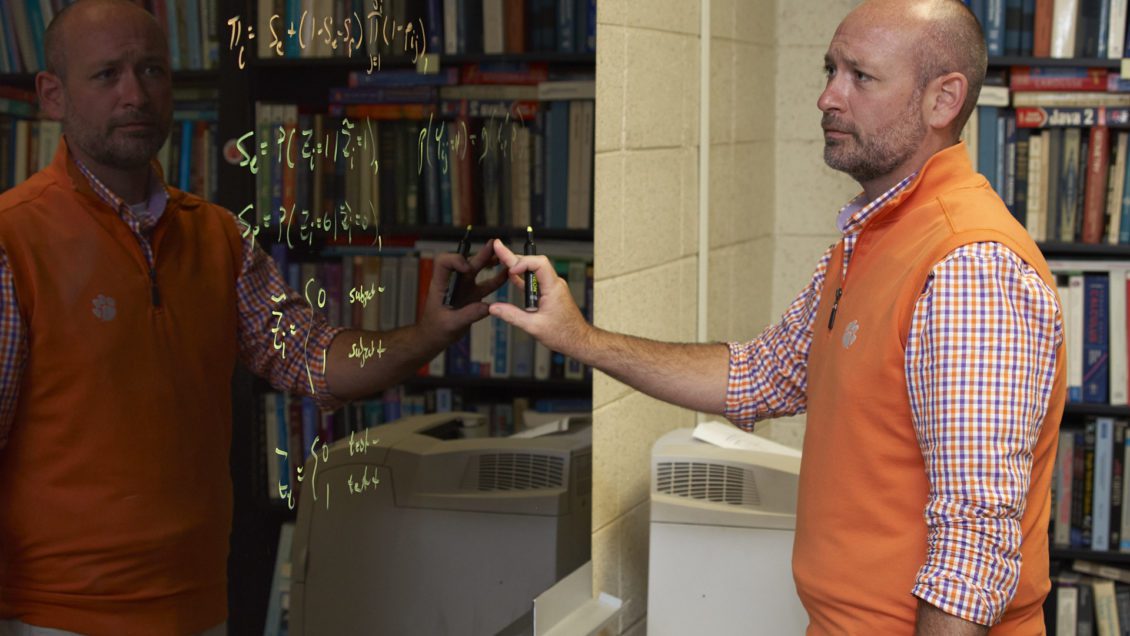A Clemson University professor has received one of the highest honors bestowed on statisticians.
Chris McMahan, a professor in the College of Science’s School of Mathematical and Statistical Sciences, has been named an American Statistical Association Fellow.
The ASA elects fellows based on their established reputation and exceptional contributions to statistical science. The ASA limits the honor to one-third of 1% of the organization’s total membership each year.
“Dr. McMahan is very deserving of this honor. Through his collaboration with researchers across the globe, he has made significant contributions in the fields of genetics, engineering, agriculture and epidemiology,” said Kevin James, director of the School of Mathematical and Statistical Sciences. “We look forward to seeing him make many more significant contributions to statistics and science.”
Influential contributions
The ASA selected McMahan for the honor for his “influential contributions in group testing and Bayesian methods; for his leadership in interdisciplinary collaboration; and for his extensive service to Clemson University and the ASA.”
“Becoming an ASA Fellow is much more than just publishing papers. It’s about significantly advancing the field of statistics and making a difference in scientific discovery. Chris has a proven record of doing this across many disciplines,” said Joshua Tebbs, chair of the University of South Carolina Department of Statistics. Tebbs was McMahan’s Ph.D. adviser and nominated his former student for the honor.
Tebbs continued, “Chris has the gifted ability to collaborate with scientists and researchers in a multitude of areas. It is sometimes hard to frame a researcher’s goals in terms of statistical models and methods, but Chris does this with absolute ease. It’s probably why everybody wants to work with him.”
During his career, McMahan has modeled the spread of vector-borne disease and studied allergy desensitization therapies, automated structure detection in neuroimaging, genetics associated with personalized medicine, genetics of agriculture, efficient infectious disease screening and surveillance, cancer, sexually transmitted disease, coupled engineering systems, environmental monitoring, biomedical applications, and epidemiology and public health.
Collaboration
McMahan has worked with more than 120 researchers from academic institutions, industry and government across several fields. He has published 81 manuscripts in peer-reviewed journals.

In addition, he has helped create 10 software packages disseminated via standard open-source software repositories. He has given 38 invited talks and has authored or co-authored more than 100 conference presentations.
McMahan has won four national and international awards for papers he has written.
He is the associate editor of The American Statistician and Statistics in Medicine. McMahan is a board member of the Companion Animal Parasite Council. He’s also a member of the External Advisory Group for the National Institute on Aging’s Carolina Center on Alzheimer’s Disease and Minority Research.
A realization
McMahan didn’t set out to be a statistician. He was double majoring in mathematics and physics at Austin Peay State University. A semester before graduation, he realized he didn’t like physics.
“What I enjoyed was using mathematics to explain what goes on in the world,” he said.
He finished his major in math and pursued a master’s degree in mathematics at Western Kentucky University. It was there that McMahan took his first statistics course. The professor encouraged him to apply to the University of South Carolina statistics program. McMahan, who hadn’t decided whether to pursue a Ph.D. in statistics or mathematics, visited the school.
“If you’ve ever done anything in life where it just feels right, that’s what happened when I visited the University of South Carolina. It just felt right,” McMahan said. “I loved explaining things with mathematics. Statistics is the nice interface between all of sciences and mathematics.”
Some of McMahan’s current research involves pool testing to reduce the cost of screening large populations for infectious diseases, which gained a lot of interest over the last couple of years with the pandemic. Over the past two years, he has concentrated on developing regression models that can still estimate the relationships between risk factors and actual infection status. That could allow scientists to design the screening process to minimize cost.
Growing importance
McMahan said with machine learning and artificial intelligence growing, statisticians will be even more critical in the future.
“All of this is statistics in my mind. Statistics is the art of taking data and using that to paint a picture about what is occurring,” he said. “As such, our field continues to thrive and flourish and will be even more relevant in the future. As science pushes forward, statisticians must dig deeper and work harder to understand what that new data is telling us.”
McMahan said his honor results partly from the efforts of students and colleagues he’s worked with over the years.
“Many prominent researchers whom I look up to are ASA fellows. To be included in that group is very humbling,” said McMahan, who will be recognized at the Joint Statistical Meetings in Washington, D.C., in August.
The College of Science pursues excellence in scientific discovery, learning, and engagement that is both locally relevant and globally impactful. The life, physical, and mathematical sciences converge to tackle some of tomorrow’s scientific challenges, and our faculty are preparing the next generation of leading scientists. The College of Science offers high-impact transformational experiences such as research, internships, and study abroad to help prepare our graduates for top industries, graduate programs, and health professions. clemson.edu/science
Get in touch and we will connect you with the author or another expert.
Or email us at news@clemson.edu

